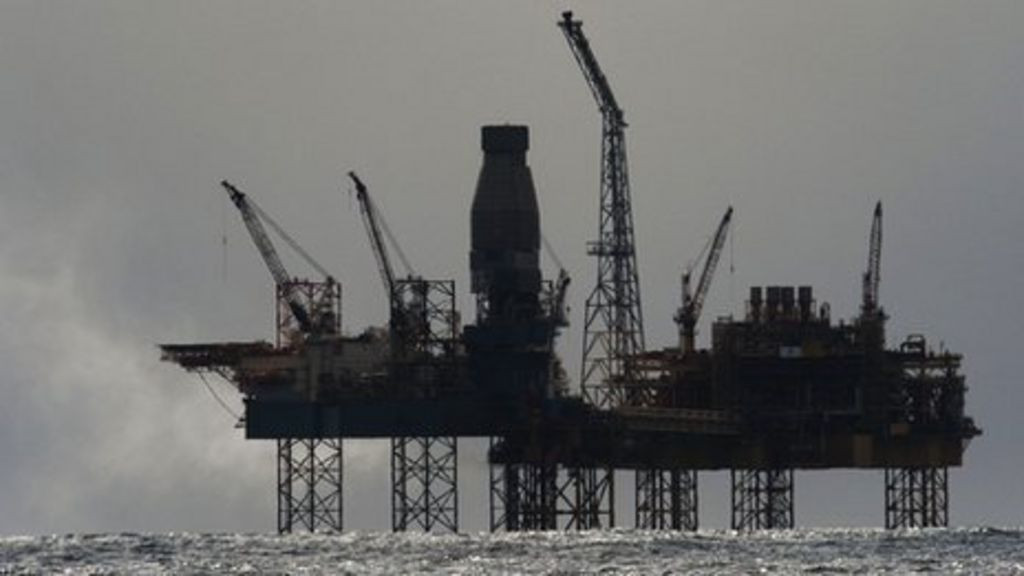Firms across the UK's oil and gas supply chain have expressed “grave concern” about government plans to hike windfall taxes and eliminate investment incentives to an industry that supports 200,000 jobs. In an open letter to HM Treasury, seen by the BBC, 42 companies have warned that official plans threaten £200bn of investment in all forms of domestic energy, including renewables. The signatories include manufacturing, engineering and technology companies. The Treasury said, however, that its industrial strategy would create “thousands of new jobs in the industries of the future”. The government currently plans to increase windfall taxes on oil and gas profits from 75% to 78%, extend the tax until 2030 and abolish tax incentives for further investment. In the letter, issued by Offshore Energies UK, firms express concern that reduced investment and greater uncertainty would be felt throughout the supply chain “through jobs, and the communities this industry supports, both directly and indirectly.” They also argue that oil and gas revenues are helping fund investment in renewable energy. A hostile tax environment would threaten not only the oil and gas industry, but also the firms who invest in renewable energies using cash generated through fossil fuels, the letter suggests. “The companies investing in nascent opportunities like floating offshore wind and carbon capture and storage will require the cashflow from a stable and predictable oil and gas business to fund these opportunities,” it says. “Sufficient investment in the UK energy transition can only happen if we support, not undermine our domestic oil and gas sector.” The new government’s plans to increase and extend windfall taxes while reducing investment allowances was clear in the Labour manifesto. But the offshore energy industry had hoped for a consultation with the new government and are calling for a role in its industrial strategy council. The letter says those across the energy industry look at current proposals with “grave concern that these would be a blunt response which could undermine the levers to long term solutions and jeopardise jobs in communities across the UK.” David Whitehouse, chief executive of Offshore Energies UK, told the BBC’s Today programme the “vast majority” of the companies which signed the letter were “smaller companies”. “These are not the energy giants that people talk about...They are the lifeblood of the UK economy,” he added. A windfall tax of 78% would bring the UK in line with Norway but energy industry officials insist that Norway has had a much more stable tax and regulatory regime, which also offers generous incentives for investment. The previous Conservative government imposed two tax hikes on UK oil and gas profits - raising them to 65% and then 75% in response to soaring energy prices following Russia’s invasion of Ukraine. Last May, Harbour Energy, the UK's largest oil and gas producer, told staff it would cut 350 UK jobs, blaming the UK government's windfall tax changes. A Treasury spokesperson said that it is “strengthening the previous government's windfall tax to ensure North Sea oil and gas producers contribute their fair share towards our energy transition”. “Our plans for a new National Wealth Fund and establish Great British Energy will create thousands of new jobs in the industries of the future,” they added. Chancellor Rachel Reeves has previously said some taxes will be increased at the autumn Budget, but Labour has also said there would be no tax rises on “working people”. Lucy Coutts, investment director at wealth manager JM Finn, this had led to “many industries and professions” beginning to wonder “where these tax hikes are going to come from?” “Maybe tax hikes for oil and has, maybe even for banks. So everyone is a little bit nervous about what decisions Rachel Reeves is going to make in October,” she added. The UK’s oil industry has had a tough few years. The future does not promise a change in a positive direction, either. It seems all hope for this has been lost, and some oil drillers are looking at other jurisdictions for their future survival. This is certainly the case for Serica Energy, one of the biggest suppliers of oil and gas to the UK, operating fields in the North Sea. Once upon a time, the North Sea was one of the biggest oil- and gas-producing regions in the world. Serica Energy chairman David Latin recently dropped what should have been a giant bomb for any government concerned with energy security. “The UK is now fiscally more unstable than almost anywhere else on the planet,” he said, as quoted by the Telegraph. “That means we are looking for new places to invest our money. And Norway is a place where potentially we could recreate our business model.” The statement by Latin is nothing but a confirmation that a Labour government fixated on boosting the amount of wind and solar capacity in the country and funding this boost with oil and gas tax money is driving the industry away. Plans to further increase windfall profit taxes on the industry and the removal of a tax incentive that kept producers at home until the Keir Starmer government took over might prove the last nudge out the door. There is also uncertainty about future energy policies that make North Sea oil and gas operators reluctant to invest in local production. “[Policy uncertainty] reduces our willingness to spend money to do things quickly because if we spend and the policy changes, then we have to start all over again,” the chairman of one relatively small producer, Ping Petroleum, told the Financial Times this week. “People are walking away from fields with significant reserves,” Robert Fisher said. As Serica’s chairman suggests, those who are walking away from the British North Sea will probably find other places to invest their money. The British government, however, would be hard-placed to find another industry it could fleece that deeply and get away with it. And this is a big problem because Labour has promised a fast and ambitious transition to wind, solar, and hydrogen. And fast and ambitious costs more money than just one or the other. The Financial Times reported that tax income from the oil and gas industry had reached close to 10 billion pounds last year, but the amount is set to drop off a cliff over the next five years to just above 2 billion pounds in 2028. This will not be enough to fund what the Labour government calls Great British Energy—the state-owned transition vehicle for financing the transition. “If the government implements the kind of windfall taxes they are talking about, then you end up with a cliff edge in UK energy production because the industry will be taxed into uncompetitiveness,” Stifel analyst Chris Wheaton told the Financial Times. “That is going to cause a very dramatic decline in investment and therefore production and jobs, and a big hit to energy security.” In other words, if oil and gas producers currently operating in the British section of the North Sea want to ensure their long-term survival, they’d better look for opportunities abroad. For Serica, Norway is the no-brainer destination. If it doesn’t work there, the company will look elsewhere, per its chairman. The important bit is that it will no longer supply oil and gas to the UK. And if others follow, there will be thousands of jobs lost, and the UK will, rather ironically, become even more dependent on energy imports. UK taxes on oil and gas profits have risen from 40% to about 78% in the past three years, prompting several energy companies to think about pulling out of the country. North Sea gas company Serica Energy says it is considering pulling out of Britain and look at establishing itself in Nordic countries such as Norway, because of the UK's increasingly heavy tax regime. If so, this could be a significant blow to Britain's energy sector, which has seen several offshore energy companies exit the country following steep tax hikes. Serica Energy currently accounts for between 41,000 and 46,000 barrels of oil per day, as well as about 5% of gas supply in the UK. The UK's attractiveness as a drilling destination has been falling recently, following taxes on UK oil and gas profits being raised from 40% to about 78% in three years. Now, with UK Chancellor Rachel Reeves hinting that more tax rises could be seen in the upcoming Budget, companies have started looking at exit plans from Britain. For companies such as Serica Energy, which purchases older oil and gas fields in the North Sea and turns them around in order to start generating revenues again, Norway is seen as a good alternative to Britain. This is because of the relative ease of setting up a similar business model in Norway, especially given its huge offshore energy market and strong network of suppliers. Norway also has extensive experience in the oil and gas industry, and is highly renowned for its technology, operational efficiency and stable business climate. Not only that, but it also has double tax treaties with a number of other countries, which can be attractive for companies looking to expand globally. Serica Energy says it is looking at other countries as well around the North Sea as potential options for relocation. Serica Energy chairman David Latin was quoted by The Telegraph as saying: “The consequences of being a purely British-based company are horrific at the moment. “Just look at what happened on the day that the Labour manifesto was announced. There was hardly any impact on the share price of the oil and gas giants because their profits are made abroad. “But for small UK-based companies like ours, the downward share price movement was really substantial.” The UK is still heavily dependent on energy imports. The country's net energy imports came up to 40.8% in 2023, according to the Digest of UK Energy Statistics (DUKES), an increase from 37% in 2022. With the UK still getting the majority of its energy needs from fossil fuels, tax rises on energy companies are a growing problem, as more companies choose to move on. This could be compounded by the country's inability to speed up its renewable energy infrastructure at the same pace, leading to it being more dependent on energy imports and therefore becoming more economically vulnerable. A number of politicians are under pressure from environmental groups who are calling on them to take decisive action against oil and gas companies, without offering a viable plan on how to replace fossil fuels with renewable energy without running out of the energy needed meanwhile. Several other companies, including Shell, are considering moving to the US, where energy companies are still welcomed, and can take advantage of higher valuations and a wider range of investors. Docked in the Cromarty Firth near Inverness in north-east Scotland, Ping Petroleum’s vessel for extracting and storing up to 270,000 barrels of oil is an imposing presence in a port full of components set to power the UK economy. Some 60 metres in diameter and about 45 metres tall, the Excalibur is a floating ship deployed near platforms to receive, store and process oil before transferring it into tankers. Ping bought the vessel in mid-2022 as energy prices surged after Russia’s full-scale invasion of Ukraine, and anticipated using it for up to 15 years. But the imposition of a windfall tax on oil and gas groups in the UK and potential changes in regulation have caused the company to delay plans for a roughly £100mn refurbishment, which would make the ship one of the first to run on electricity. Higher levies mean Ping is one of several smaller companies whose bets on eking out profits from the UK’s ageing oil basin by taking over assets being abandoned by international majors risk turning sour. “[Policy uncertainty] reduces our willingness to spend money to do things quickly because if we spend and the policy changes, then we have to start all over again,” said Ping chair Robert Fisher aboard the vessel. “People are walking away from fields with significant reserves.” The Labour government last month delivered on its pre-election pledge to lift the headline taxes on oil and gas companies by 3 percentage points to 78 per cent and extend the windfall tax by one year to 2030. The move to increase the tax, first introduced by then Conservative chancellor Rishi Sunak in May 2022, sparked an outcry from industry bosses, who warned it would hurt long-term tax take by leading more companies to abandon projects and fire workers. Estimates published before Labour’s announcement by the Office for Budget Responsibility, the fiscal watchdog, showed tax receipts from the UK oil and gas industry would collapse to £2.2bn by 2029 from £9.8bn in 2023. Executives have sounded the alarm over Labour’s plan to axe allowances that enable companies to offset investment spending against their tax bill, saying the move would exacerbate a decline in the industry’s share of private sector investment. The government said last month it would provide the final details of its tax plans in its first Budget on October 30, leaving the sector holding its breath. Chris Wheaton, analyst at investment bank Stifel, said Labour’s changes to windfall taxes would raise about £4bn more for the Treasury — less than the £6bn the party is targeting to help fund GB Energy, the new state-owned company that will invest in renewable energy. The government would then lose about £11bn in tax revenue over five years, he estimated. “If the government implements the kind of windfall taxes they are talking about, then you end up with a cliff edge in UK energy production because the industry will be taxed into uncompetitiveness,” Wheaton said. “That is going to cause a very dramatic decline in investment and therefore production and jobs, and a big hit to energy security.” The industry is already grappling with a big drop in production, which fell to 1.27mn barrels of oil equivalent a day last year from 4.33mn barrels in 1998, according to the North Sea Transition Authority. The regulator estimates production will slump to just 730,000 barrels of oil equivalent in 2030. David Whitehouse, chief executive of industry group Offshore Energies UK, said general uncertainty and the windfall tax had “meant that so far this year we are at historical lows for wells drilled in the North Sea and that fundamentally means we are not seeing the investment that the sector needs”. Labour’s opposition to new drilling licences has also put the party at odds with trade union allies such as Unite. It said the measures risked turning oil and gas workers into the “coal miners of our generation” before a “just transition” to cleaner forms of energy could replace the often highly paid and skilled jobs. More than 55,000 jobs supported by the North Sea industry have been lost in the past five years, according to OEUK, leaving just over 200,000, although climate campaigners argue that new drilling will not protect jobs or ensure energy security. HM Treasury said it was “extending and increasing the Energy Profits Levy, and closing its core investment allowance, to ensure oil and gas companies contribute more towards our clean energy transition”.“We will work with the sector to ensure the transition over the next decades does not jeopardise workers,” it added. The government’s position does have its supporters. James Alexander, chief executive of UK Sustainable Investment and Finance Association, which promotes sustainable investment, said the 3 percentage point increase in the windfall tax “puts us in line with Norway and is earmarked to be catalytic for driving private investment into renewables . . . It is exactly what we want to see”. Trader Viaro Energy also bet on the North Sea in 2020, paying £248mn to buy RockRose Energy to expand into production. Chief executive Francesco Mazzagatti said Viaro remained committed to the UK but that “erratic decisions” by the last government had forced companies to “learn to plan for the unplannable”. Back at the Excalibur, whose delayed refurbishment has put at least 200 jobs on hold, Fisher said that despite changing attitudes to his industry it would have a vital role to play in the energy transition. “When we were selling oil in the late 1970s [and] early 80s, everybody wanted it,” he said. “Now there is a sense that we are not needed quite so much.”
Emily Brown
Business Analyst
Analyzing the financial world one report at a time.


















